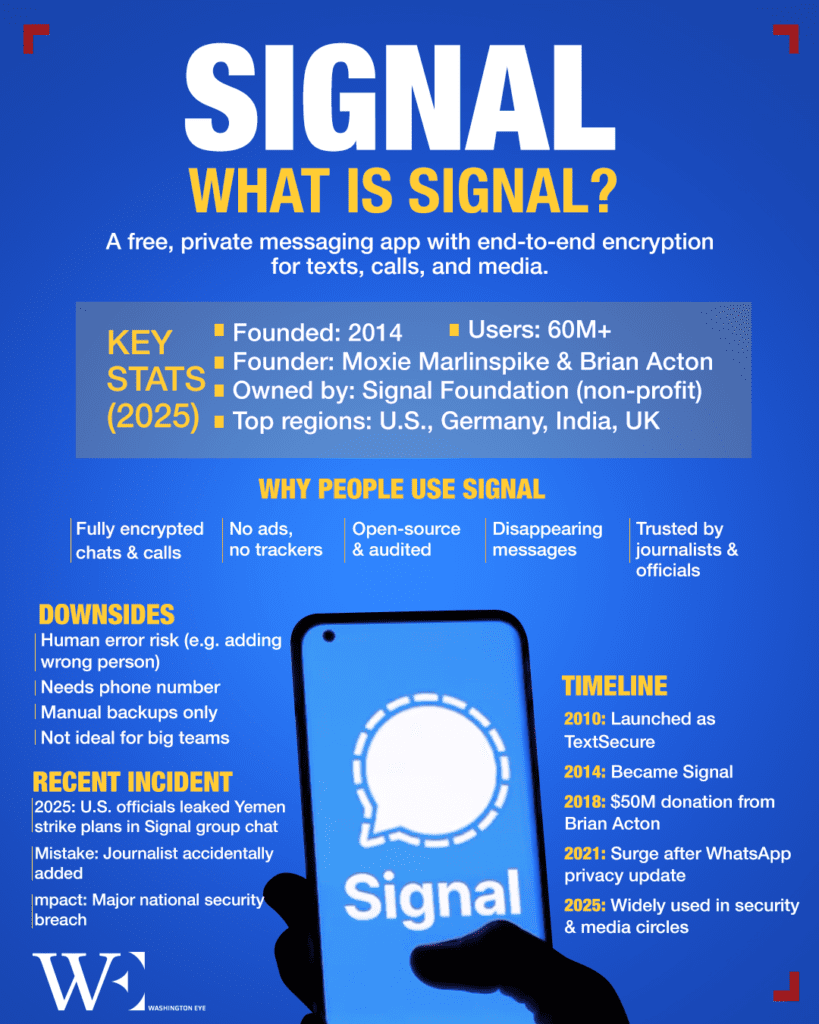There are few U.S. presidential actions more sensitive, or more laden with geopolitical consequence, than the decision to use military force. When the plans for such actions fall into the wrong hands—or worse, are mishandled by those entrusted with them—the damage goes beyond tactical risk. It exposes deep cracks in strategic alliances, erodes trust among partners, and compromises diplomatic leverage.
The recent revelation that a senior group of Trump administration national security officials used the encrypted messaging app Signal to coordinate air strikes in Yemen—and that a prominent journalist was inadvertently included in the chat—has thrown the administration into a storm of criticism.
It is an operational failure of staggering proportions. But more than that, it’s a diplomatic blunder that has serious implications for U.S. relations with Europe and Egypt, two actors whose cooperation is increasingly critical in the Red Sea and Gaza theatres.
The message thread included Vice-President JD Vance, CIA Director John Ratcliffe, Defence Secretary Pete Hegseth, and other senior officials. It debated policy, disclosed operational timing, and ultimately celebrated the execution of airstrikes against Houthi targets in Yemen. That a journalist was mistakenly included—offering an outsider a real-time window into the decision-making process—should set off alarms in every allied capital. Yet it’s not just the exposure of classified information that should concern observers; it’s what the content reveals about internal disunity and external strategy.
Nowhere is this more sensitive than in Egypt. The airstrikes, while aimed at disrupting Houthi drone and missile capabilities threatening Red Sea shipping, touch directly on Cairo’s political anxieties. Egypt is already buckling under the weight of an economic crisis marked by spiralling inflation, currency devaluation, and IMF-imposed austerity. With foreign reserves shrinking and public discontent growing, President Abdel Fattah El-Sisi has little room to manoeuvre diplomatically—let alone absorb additional burdens stemming from a conflict he did not start.
Yet Egypt finds itself at the centre of geopolitical recalculations once again. The recent strikes come as pressure mounts—both subtly and overtly—for Egypt to play a larger role in regional containment strategies. Most notably, this includes the controversial notion of accommodating displaced Palestinians from Gaza, either temporarily or as part of a longer-term resettlement plan.
Though the so-called “Gaza Riviera” concept, floated earlier in Trump’s second term, was dismissed publicly, the resumption of U.S.-Israel coordination and now this curious leak suggest its logic may not be entirely buried. With Rafah as Gaza’s final civilian exit point, and with Israeli pressure at its doorstep, Cairo is being squeezed. The Signal chat’s accidental visibility to a journalist could be read less as a breach and more as a pressure tactic: a way to demonstrate that decisions are being made—with or without Egypt’s formal involvement.
For Cairo, this is a dangerous proposition. Accepting displaced Gazans would undermine its longstanding position against altering regional demographics and invite domestic backlash from a population already suffering under economic hardship. But refusal risks a reduction in Western goodwill, aid, and diplomatic cover. The airstrikes, framed as necessary countermeasures against the Houthis, also serve to remind Egypt that instability in the region will not pause for its internal challenges.
Equally telling is the content of the chat concerning Europe. Vice President JD Vance’s remarks—privately expressing distaste for what he viewed as American resources being spent to “bail out Europe again”—strike at the heart of transatlantic tension. His commentary, dismissing the Houthis as more of a European problem due to their impact on EU-bound shipping, betrays a growing sentiment among U.S. hardliners: that Europe should shoulder more responsibility for its own security.
This is a shift from alliance-building to transactionalism. The message to Brussels is clear: don’t expect Washington to carry your burden. Whether intentional or not, the leak has now publicised this posture, potentially hardening European scepticism at a moment when alignment is desperately needed. The Red Sea remains a critical artery for global trade, and Houthi threats—emboldened by the Iran-backed group’s survival and adaptation—have continued despite targeted strikes. European navies have stepped up patrols, but without cohesive U.S.-EU cooperation, the threat to maritime security endures.
The chat also revealed fractures within the Trump administration’s own national security team. Vance, despite being vice-president, expressed concern that the president was unaware of how inconsistent the strike was with his messaging on European freeloading. This is not a policy debate—it’s a signal of incoherence within the command structure. Such ambiguity, when revealed publicly, erodes credibility both in Washington and among allies abroad.
For the Houthis, this mishap may be viewed as a propaganda victory. A U.S. administration airing its strategic calculations and internal disagreements in plain sight offers both psychological and tactical advantages. It suggests vulnerability—not just in military planning, but in the coherence of Western resolve. The Houthis, emboldened by regional sympathies and sustained Iranian support, may interpret this as a green light to escalate, especially if they believe U.S. political will is fraying under internal discord.
Looking forward, the implications of this incident for U.S. engagement in Yemen are severe. A publicised lack of consensus and a willingness to bypass formal processes—both in decision-making and in digital communication—may lead allies to hedge their bets. European partners might delay commitments to maritime coalitions, waiting to see if U.S. policy stabilises. Egypt could resist pressure to expand its role, particularly if it suspects that Washington is using covert means to shift responsibility onto its shoulders.
And in Yemen itself, the risk is that these strikes will not deter, but rather provoke further retaliation—against shipping, commercial vessels, or even Saudi and Emirati interests. The absence of a clear, united front from the U.S. only increases that possibility.
At the heart of this debacle lies a larger problem: the erosion of discipline in how America conducts itself on the world stage. Foreign policy, especially in conflict zones, requires clarity, confidentiality, and competence. The Signal chat incident fails all three tests. It has exposed not just plans, but postures; not just tactics, but tensions.
Trust, once broken, is hard to repair. For Egypt and Europe, the lesson is clear: the U.S. may remain a powerful actor, but it is not always a predictable one. In regions where diplomacy depends on discretion and coordination, that unpredictability is a liability, not a strength.
As Washington faces mounting challenges—from a resurgent Iran to rising instability in the Red Sea—it cannot afford to gamble its alliances on unsecured chat groups and emojis of fire.
The world is watching. And it now knows more than it should.















